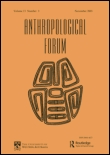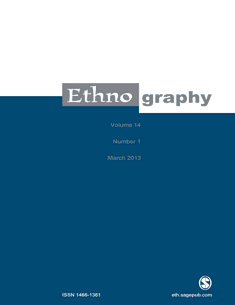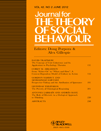
ANTHROPOS
Scope & Guideline
Enriching academic discourse since 1983.
Introduction
Aims and Scopes
- Cultural Anthropology:
The journal emphasizes the study of diverse cultures, exploring their social structures, belief systems, and practices, with a focus on ethnographic methodologies. - Religious Studies:
A significant area of interest is the exploration of various religious practices and beliefs, examining how they shape identities and social relations in different contexts. - Ethnography and Fieldwork:
ANTHROPOS encourages research grounded in ethnographic fieldwork, highlighting the importance of participant observation and qualitative methods in understanding cultural phenomena. - Interdisciplinary Approaches:
The journal promotes interdisciplinary research that incorporates perspectives from history, sociology, and political science, enriching anthropological discourse. - Postcolonial Studies:
There is a consistent focus on postcolonial perspectives, examining the impacts of colonialism on contemporary cultures and identities, and exploring themes of resistance and adaptation. - Globalization and Transnationalism:
The journal addresses the effects of globalization and transnational movements on local cultures, emphasizing the interconnectedness of global and local phenomena. - Environmental Anthropology:
Research related to human-environment interactions, sustainability, and the cultural implications of ecological changes is a growing area of interest in the journal.
Trending and Emerging
- Queer Anthropology:
There is an emerging focus on queer studies within anthropology, exploring the intersections of sexuality, religion, and cultural practices, as seen in recent works addressing queer identities in South Asia. - Transnational Migration Studies:
Increased attention is being paid to the experiences and identities of transnational migrants, reflecting broader global migration patterns and their impacts on cultural practices. - Environmental Justice and Activism:
Research addressing environmental issues and activism is on the rise, emphasizing the role of indigenous knowledge and practices in confronting ecological crises. - Digital Anthropology:
The integration of digital technologies in anthropological research is gaining traction, with scholars exploring how digital spaces shape cultural interactions and identities. - Health and Healing Practices:
A growing number of studies focus on health, healing, and the socio-cultural dimensions of illness, particularly in the context of global health crises. - Indigenous Rights and Sovereignty:
There is a notable increase in research focusing on indigenous rights, sovereignty, and the impacts of colonialism on indigenous populations, reflecting a commitment to social justice. - Performance and Art as Ethnography:
An emerging interest in the use of performance and artistic practices as ethnographic methods is evident, showcasing how these forms can convey cultural narratives and experiences.
Declining or Waning
- Traditional Ethnobotany:
Research focused solely on traditional ethnobotanical practices appears to be less frequent, possibly due to a shift towards more integrated studies that combine ecological, economic, and cultural dimensions. - Colonial Narratives:
While colonial studies remain relevant, there seems to be a waning interest in purely historical accounts of colonialism without contemporary connections, as scholars increasingly focus on current implications and legacies. - Static Cultural Representations:
There is a noticeable decline in papers that offer static representations of cultures, as the journal's recent publications lean more towards dynamic and relational understandings of cultural practices. - Homogeneous Identity Studies:
Research that treats cultural identities as monolithic or static is becoming less common, with a growing emphasis on the fluidity and intersectionality of identities. - Theoretical Anthropology:
Although theoretical discussions remain important, there is a reduction in purely theoretical papers without empirical grounding, as there is a stronger demand for research that is closely tied to fieldwork and real-world applications.
Similar Journals

PARABOLA
Unveiling Underrepresented Narratives in Art and Tradition.PARABOLA is a distinctive academic journal published by SOC STUDY MYTH & TRADITION, INC, focusing on the intricate interrelations within the fields of cultural studies, religious studies, and the visual and performing arts. Established in the United States, the journal serves as a platform for scholarly discourse and creative expression, bridging theoretical insights with practical applications. While its latest impact factor reflects its emerging status in 2023, being categorized in the Q4 quartiles within its fields, PARABOLA remains dedicated to fostering a vibrant community of researchers, professionals, and students interested in the analysis of myth, tradition, and their contemporary implications. The journal's unique scope, spanning from 2002 to 2015 and resuming from 2017 to 2024, offers a rich resource for readers seeking to explore underrepresented narratives and engage with diverse methodologies. Each volume is meticulously curated to challenge conventions and stimulate critical thought, making PARABOLA an essential tool for those aiming to enhance their understanding of the cultural and artistic dimensions that shape our world.

SCHWEIZERISCHES ARCHIV FUR VOLKSKUNDE
Empowering Research in Arts and HumanitiesSCHWEIZERISCHES ARCHIV FUR VOLKSKUNDE, with ISSN 0036-794X, is a vital resource for scholars and practitioners in the fields of Arts and Humanities and Cultural Studies. Published by G KREBS VERLAGSBUCHHANDLUNG AG in Switzerland, this journal plays a crucial role in advancing the discourse surrounding folk culture, traditions, and anthropology. Despite its current ranking in the Q4 category for both Arts and Humanities and Cultural Studies, the journal serves as an essential platform for disseminating unique research findings and insights, contributing to a well-rounded understanding of diverse cultural practices. Researchers, professionals, and students are encouraged to explore the rich content produced between 2008 and 2014, and from 2017 to 2023, which reflects a commitment to fostering a multidisciplinary approach to folklore studies. By addressing the complexities of cultural dynamics, the journal not only promotes scholarly engagement but also enriches the academic community’s appreciation of folk traditions.

Social Analysis
Charting New Territories in Social AnalysisSocial Analysis, an esteemed academic journal published by BERGHAHN JOURNALS, is at the forefront of interdisciplinary research, focusing on the dynamic intersections of anthropology, cultural studies, sociology, and the arts and humanities. Since its inception in 2002 and having transitioned to an Open Access model in 2020, the journal ensures that critical social research is widely accessible to scholars and the public alike. With an impressive Q1 ranking in Anthropology and cultural studies and holding a notable Q2 in Sociology and Political Science, it garners attention from a large academic audience, as evidenced by its high Scopus rankings: 10th in general arts and humanities and 153rd in cultural studies. This signifies its influential role in shaping contemporary discourse and providing a platform for innovative ideas and methodologies in understanding social phenomena. Based in Brooklyn, NY, the journal is dedicated to fostering scholarly dialogue and advancing the field, making it an essential resource for researchers, professionals, and students eager to engage with and contribute to the field of social analysis.

Anthropological Forum
Fostering Critical Conversations in AnthropologyAnthropological Forum, an esteemed journal in the field of anthropology, is published by Routledge Journals, Taylor & Francis Ltd. With an ISSN of 0066-4677 and an E-ISSN of 1469-2902, the journal has cemented its reputation for fostering critical discussions and innovative research since its inception in 1963. Covering a broad range of topics within anthropology, it has achieved an impressive Q1 ranking in the category of Anthropology and a Q2 ranking in Arts and Humanities (miscellaneous) in 2023, showcasing its pivotal role in advancing scholarly discourse. With a Scopus ranking placing it in the top 10% of its field, the journal provides valuable insights into contemporary anthropological issues, making it an essential resource for researchers, professionals, and students alike. Although not an open-access journal, the comprehensive studies and articles published within its pages contribute significantly to the academic and professional community. Addressed out of Milton Park, Abingdon, UK, the Anthropological Forum remains a seminal platform for disseminating high-quality anthropological research.

Ethnologies
Celebrating the Complexity of Community and CultureEthnologies is a peer-reviewed academic journal published by the Folklore Studies Association of Canada, dedicated to advancing the field of ethnology and cultural studies. With its ISSN 1481-5974 and E-ISSN 1708-0401, this journal seeks to bridge the gap between theoretical frameworks and empirical research, promoting interdisciplinary dialogue among scholars and practitioners alike. The journal aims to highlight the rich diversity of human experience and cultural expression, making significant contributions to both academic communities and public understanding. Although currently not an open access publication, Ethnologies is known for its rigorous peer-review process and high-impact research articles. Situated in St. Johns, Newfoundland and Labrador, it serves as a vital resource for researchers, professionals, and students dedicated to exploring the complexities of culture and community in a global context.

Ethnography
Exploring cultural narratives through rigorous research.Ethnography is a leading peer-reviewed journal published by SAGE Publications Ltd, focusing on the field of anthropology, cultural studies, and the broader domain of arts and humanities. With an ISSN of 1466-1381 and an E-ISSN of 1741-2714, the journal has established itself as a premier outlet for innovative research and theoretical discussions that encapsulate diverse cultural narratives across the globe. Celebrated for its impact, Ethnography holds a prestigious Q1 ranking in 2023 for Anthropology and Cultural Studies, reflecting its influence in the academic community. Researchers seeking to disseminate their findings can appreciate the journal's rigorous editorial standards and the relevant scope that spans from 2000 to 2024. While not currently offering Open Access, its extensive reach and engagement provide essential insights into contemporary ethnographic practices and methodological advancements. Academics and students alike will find Ethnography an indispensable resource for critically analyzing cultures and enriching their understanding of social dynamics.

ZEITSCHRIFT FUR ETHNOLOGIE - Journal of Social and Cultural Anthropology
Capturing the Essence of Human ExperienceZEITSCHRIFT FUR ETHNOLOGIE - Journal of Social and Cultural Anthropology, published by DIETRICH REIMER VERLAG, serves as a vital platform for the dissemination of high-quality research in the fields of social and cultural anthropology. Established with a commitment to advancing scholarly dialogue, this journal captures the dynamic interplay of cultural practices and social structures across diverse contexts. With an ISSN of 0044-2666, it gained significant traction among researchers, ranking in Q3 for Cultural Studies and Q4 for miscellaneous Social Sciences in 2023. Its Scopus ranking reflects its growing impact, particularly within the 68th percentile of Cultural Studies. Although the journal does not offer open access, it remains a crucial resource for academia, fostering critical insights and innovative analyses essential for students, professionals, and scholars alike. With a publication history highlighted by a convergence of issues from 1981 and various intervals, the journal is poised to shape debates in anthropological research both locally within Germany and globally.

Interventions-International Journal of Postcolonial Studies
Fostering Innovative Research in Postcolonial Theory.Interventions - International Journal of Postcolonial Studies, published by Routledge Journals, Taylor & Francis Ltd, stands at the intersection of anthropology and history, providing a crucial platform for scholarly discourse in the field of postcolonial studies. With a commendable impact, as indicated by its Q2 ranking in Anthropology and Q1 ranking in History for 2023, the journal serves a diverse audience of researchers, professionals, and students seeking to engage with critical analyses of colonial legacies and their contemporary implications. Covering an array of topics from 2010 to 2024, Interventions upholds a high academic standard, reflected in its notable rankings on Scopus. Despite not offering an open-access model, the journal remains an essential resource for academics committed to exploring the multifaceted dynamics of postcolonial theory and its applications across various disciplines. By fostering insightful dialogue and innovative research, Interventions contributes significantly to the global understanding of postcolonial issues and the complexities surrounding identity, culture, and power.

JOURNAL FOR THE THEORY OF SOCIAL BEHAVIOUR
Exploring the depths of human interaction.The Journal for the Theory of Social Behaviour is a prestigious academic journal published by Wiley, dedicated to advancing the field of social behavior theory. With an ISSN of 0021-8308 and an E-ISSN of 1468-5914, this journal has been at the forefront of research since its inception in 1971 and will continue to provide essential insights through to 2024. It boasts an impressive ranking in various categories, having achieved Q1 status in Philosophy and Q2 rankings in both Psychology (miscellaneous) and Social Psychology as of 2023. The journal is highly regarded in the academic community, with Scopus rankings placing it within the top tiers of its fields (Arts and Humanities, Psychology). Although not open access, it offers rich, peer-reviewed content that is invaluable to researchers, professionals, and students alike who are looking to deepen their understanding of social behavior, theory development, and related psychological frameworks. For those committed to exploring, debating, and disseminating research in this dynamic domain, The Journal for the Theory of Social Behaviour stands as a vital resource.

Religions
Illuminating Diverse Perspectives on Religious PhenomenaReligions, published by MDPI, stands as a premier open-access journal in the field of religious studies, having been established in 2010. With its E-ISSN 2077-1444, this journal is dedicated to advancing scholarly dialogue and research on a broad spectrum of religious phenomena, examined through interdisciplinary lenses that encompass historical, sociocultural, and philosophical perspectives. Based in Switzerland at ST ALBAN-ANLAGE 66, the journal has garnered a reputation for its rigorous academic standards, as evidenced by its 2023 Q1 ranking in Religious Studies and its impressive position within the top 90th percentile among its peers, ranking #59 out of 644 in the Scopus Arts and Humanities category. Access to cutting-edge research is made freely available to all readers, promoting inclusivity and collaboration in study pursuits. With a commitment to exploring the complexities of belief systems worldwide up to the year 2024, Religions is an essential resource for researchers, professionals, and students seeking to deepen their understanding of the dynamics that shape religious experience and discourse.